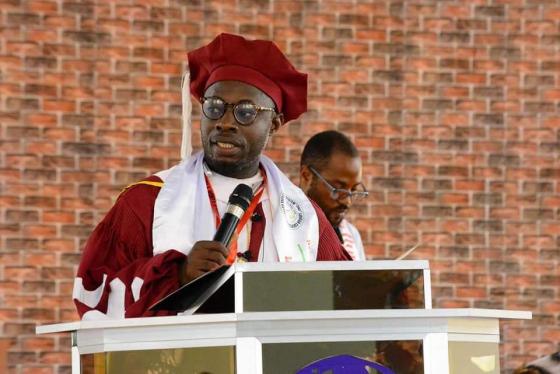Liberia: WASSCE Begins Tuesday: Are Students Ready?

WASSCE: National Principals Association: Dr. Benjamin Wehye
— National Principals Association Wants GoL, others do right by students to boost confidence, exam results
As about fifty thousand (50,000) or more senior high school students prepare to sit the West African Schools Senior Certificate Exams (WASSCE) on Tuesday, May 16, the National Association of Liberia School Principals (NALSP) is calling on the government of Liberia, participating school administrators, and all other stakeholders to do what is right in order to save the country from massive failures.
NALSP has called on the government and the West African Examinations Council (WAEC) to review protocols that it claims have continuously undermined students’ success in Liberia.
In a press statement, Dr. Benjamin Y. Wehye, head and spokesperson of the Association, noted that it has been too long for Liberia to continue struggling for excellent performance and be on par with its counterparts, including Ghana, Nigeria, Sierra Leone, and The Gambia.
According to him, available statistics show that Liberia has been the least performing country in WASSCE for many years, and now is the time to change the narrative.
“On Monday, May 16, 2023, nearly 50,000 students from Liberia will join their Anglophone West African counterparts to sit the 2023 WASSCE exams. Liberia has not just been the last country to join this international arrangement in 2018, but it has also consistently been the last country in every merit-based indicator, including mediocre benchmarks set for passage, predicted and transparent protocols for pre- and post-exam administration, and, above all, recognition of candidates for annual awards,”
Wehye said.
He pointed out that, “as much as the causes of these problems are systematic, the repetitive negligence on the part of MOE, WAEC, and some school administrators is frustrating.”
Wehye, who is also the president of the Liberia Cooperative Standard Education School System (LICOSESS), says the government’s fault is its failure to pay WAEC students fees on time.
He said that while the government's commitment to pay the students’ WASSCE fee is welcome, WAEC has repeatedly complained about the Geoge Weah administration not paying on time as required.
“The Government of Liberia has consistently remained indebted to WAEC International, spanning over the last 6 years since Liberia’s ascension. The shame and inconveniences that come with such irresponsible behaviour do not just affect our national prestige but also affect the administration of the exams, as Liberia has to devise (sometimes) unorthodox means of printing her own exams and importing exam materials from sister countries,” he disclosed.
“Due to this irresponsible behavior, authorities at the Ministry of Education (MOE) and WAEC Liberia have lost “voice", in WAEC international meetings.”
Wehye said NALSP wants the government to make allotments in the coming national fiscal budget year to significantly meet her obligation to WAEC. “If not, MOE will meet stiff resistance in the payment of permit fees by school authorities in the 2023/2024 academic year,” he warned.
He said NALSP wonders why the Government of Liberia is so effective in collecting huge permit fees from thousands of schools through its domestic tax mechanisms, but would refuse to meet international obligations.
NALSP’s spokesperson added that the distribution of exam materials, especially the Customized Mathematical Set (CMS), has been consistently delayed, which continues to affect students’ performance on the exams.
“While the CMS is the only approved instrument used by candidates for taking the exams, records show that students go to the exams without the approved instrument,” he explained. “For the benefit of the public, this instrument does not just include the calculator but also includes the pen, 2HB pencil, and sharpener required for writing the exams.”
NALSP’s head said the psychological effect of entering an already tense exam hall without the proper instruments being distributed far ahead of time has affected outcomes in the exams over time in the country.
He called on the government to make timely distribution of the materials to participating schools and also allow the administrations of the same schools to collect the materials from those sitting WASSCE this year and keep them safe for others to sit the exams next year.
“In such a case, the government of Liberia will be left with nearly a million dollars next year to help build or improve laboratories and libraries in schools selected on the basis of over-average performance in the exams this year,” Wehye suggested.
He called on WAEC to fully refund the US$7 paid by 9th graders in privately run schools since they did not receive the instruments until the exam was over.
“NALSPP also called on school authorities, especially principals and proprietors, to step up their game. Proprietors should henceforth see technological awareness as a criterion for hiring school principals and leaders. Current principals should also see this as a criterion for hiring junior administrators and teachers. The consistent delays and irregularities associated with the registration of school candidates during the registration period are alarming and disgusting,” he recommended.
He concluded by calling on school administrators to prioritise the spreading of messages of peace among students and parents ahead of the October 10 elections.
“This can be done during assemblies (devotions) and during civics classes. Messages about drug abuse and its consequences should not be overlooked at this time. We have a role to play now, not just to save Liberia, but our various institutions, as crisis times know no personality or institution.”
